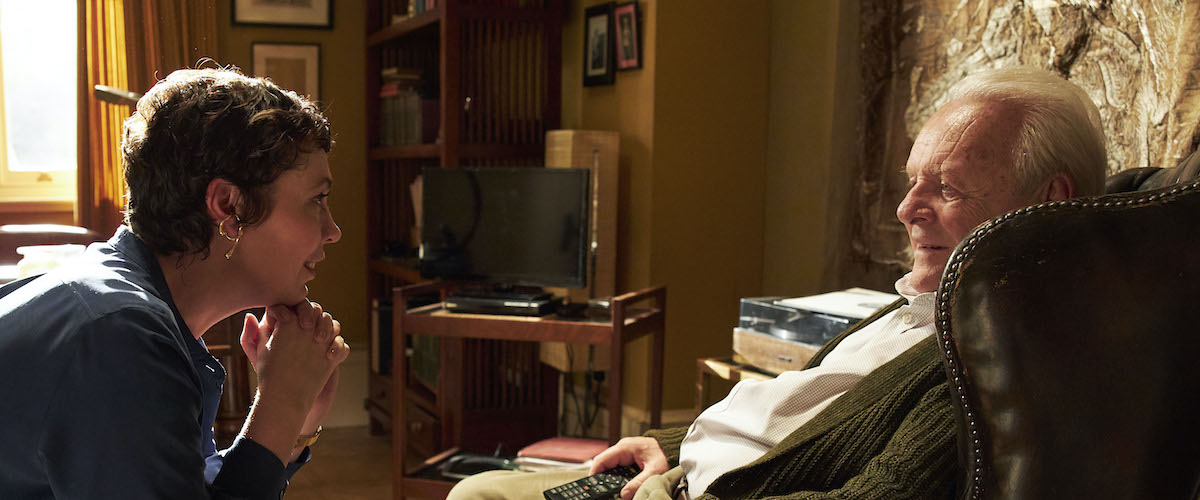
Making a film about a dementia patient told largely from the perspective of the patient is a novel and rather ingenious concept. Of course, our patient would be the ultimate unreliable narrator, but it might give us insight into the disorienting experience of Alzheimer’s. Roger Ebert once called films “empathy machines” and a film like this would certainly be an opportunity to demonstrate that. Indeed, it might even border on horror, what with its shifting perspectives and timelines and realities.
And that, I’m afraid is where Florian Zeller’s The Father, based on his own smash hit play, goes wrong for me. He leans too strongly into the horror tropes, to the point where it seems the film is less about truly understanding the experience of a dementia patient and more about messing with the audience. Yes, I believe that a dementia patient might confuse various people’s identities, make up conversations, and get lost in a time loop of sorts. But I think it’s more subtle than that—The Father really does play like one of those mind-bending films like Shutter Island or Identity. In particular, there’s a scene where our narrator experiences the exact same sequence of events twice in a row, with a slightly changed outcome—which almost seemed to be getting into Christopher Nolan territory.
That said, the film does deliver an enormous amount of empathy, mostly thanks to the nuanced and heartbreaking performances of its two leads. As Anthony, the great Welsh actor Anthony Hopkins is mesmerizing. One senses that Anthony was a powerful and commanding, perhaps even intimidating, presence before his illness and his ego still can’t fully accept what is happening to him. He mocks and scolds people for misunderstanding him. When he loses things, mostly his watch, an ongoing motif (and another Nolan-esque metaphor), he insists it has been stolen. “There’s something funny going on!” he bellows, when he is confused. At one point he cracks that his daughter, Anne (Olivia Colman), is “suffering from memory loss.” But there is a slightly frantic edge to all of this, as though he’s partly blustering to convince himself. He’s even more touching, however, in those moments when he loses the anger and expresses his vulnerability and fear. “What will become of me?” he moans, when Anne tells him she’s moving to Paris. At another point, he cries like a baby in a caregiver’s arms.
As for Paris, I should add that Anne is probably moving to Paris. This is part of the shifting perspectives Zeller plays with. In one scene, she’s married (her husband changes identify, too). In another, she’s single and off to meet a lover in Paris. In a few scenes, she’s played by a completely different actress (Olivia Williams). But it’s Colman who does the heavy lifting—literally and figuratively. One thing The Father understands perfectly is the thankless burden of being a caregiver. Her father frequently yells at her. Her husband (for much of the film he’s played by Rufus Sewell) wants her to put Anthony in a home. She’s constantly searching for lost watches and helping her father get untangled from the arms of a sweater and making excuses for her father’s rude outbursts. In one scene, however, Anthony actually says, “Thank you for everything” and her face crumples a bit. These are the words she has so desperately needed to hear, and Colman plays it perfectly—a moment of relief and then a quick gathering of composure so that she doesn’t completely fall apart.
As I mentioned, The Father was originally a play—and it shows. For starters, it almost all takes place in one apartment. (“My flat,” Anthony keeps calling it, even though it’s actually Anne’s flat.) There’s a specific narrative reason for this, but it doesn’t help open things up in a cinematic way. Also, there are certain moments in a play written for that special wave of shock that can ripple through a crowded theater—that wonderful thing when the silence has its own weight. The Father is filled with moments like that—as when Sewell’s Paul slaps Anthony (again, this may or may not have actually happened) or when Anthony insults a home aide (Imogen Poots) with cruel precision. Moments that I’m sure led to a meaningful silence in the theater but feel a little too ginned up for a film.
Right now, The Father is sitting with a gaudy 98-percent positive on Rotten Tomatoes. Obviously, many were moved by the film and even more people found its unique perspective compelling (it is certainly skillfully done). I couldn’t get past the fact that it sacrificed emotional truth for clever gimmicks. I wanted to love The Father, but I felt jerked around by it instead. Nonetheless, for the performances alone, it’s worth seeing.
The Father is now playing at the Charles Theatre (!). It is also available on demand.
